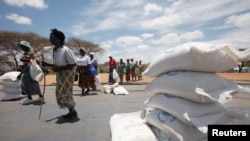JOHANNESBURG —
An estimated 2.2 million Zimbabweans are facing food insecurity in the country that once was known as the breadbasket of southern Africa. Zimbabwe is now counting on imports of 150,000 tons of corn from South Africa to overcome a shortage.
In 2000, Zimbabwe produced 2.1 million tons of corn. Thirteen years later, the country produced 800,000 tons. The steep decline in corn production has led to the country importing more and more corn.
This year is no different, and with rainfalls less than expected, Zimbabwe just announced it will be importing 150,000 tons of corn from South Africa.
Zimbabwe's annual corn consumption, both as feed and for human consumption, is about 2 million tons, according to Jonathan Pound, an economist with the United Nations Food and Agricultural Organization.
"They normally have to import quite a large quantity to satisfy their domestic requirements," he said.
But after a decent production year in 2012 of 1.4 million tons, a fall to 800,000 tons has left a larger gap to fill.
According to the Zimbabwe Vulnerability Assessment committee, 2.2 million people -- one out of four people in rural areas -- will face food insecurity between January and March.
Zambia, also an exporter of corn to Zimbabwe, has also experienced a drop in production this year.
The lack of corn from its usual markets has put Zimbabwe in a tough position.
Pound says some rural regions of Zimbabwe have been hard hit.
"Zimbabwe, over the years, has always faced problems of food and security like many countries in the sub-region. Obviously, there is a problem this year because production was reduced fairly significantly from the average and also from the previous year. So many of the households, particularly in the western and southern regions, they faced supply shortage, so they weren't able to meet their consumption requirements," he said.
One of the issues has been rainfall. The majority of corn farmers in the country are solely dependent on rain to water their crops.
"For the 2013 crop, the rains weren't so favorable in the western and southern regions," Pound said. "So this had a large impact on production. Especially because practically all of the maize produced by small holders is rain-fed as well, is not irrigated."
The country's corn production has dropped significantly over the last decade. In the early 2000s, white-owned commercial farms in the country were taken over, often by force, under President Robert Mugabe land redistribution program. The new black owners often lacked the funds and experience to make their farms productive.
With the country remaining short on cash, corn production is unlikely to rise back to previous levels, barring an infusion of funds from abroad, and a year of very good rainfall.
In 2000, Zimbabwe produced 2.1 million tons of corn. Thirteen years later, the country produced 800,000 tons. The steep decline in corn production has led to the country importing more and more corn.
This year is no different, and with rainfalls less than expected, Zimbabwe just announced it will be importing 150,000 tons of corn from South Africa.
Zimbabwe's annual corn consumption, both as feed and for human consumption, is about 2 million tons, according to Jonathan Pound, an economist with the United Nations Food and Agricultural Organization.
"They normally have to import quite a large quantity to satisfy their domestic requirements," he said.
But after a decent production year in 2012 of 1.4 million tons, a fall to 800,000 tons has left a larger gap to fill.
According to the Zimbabwe Vulnerability Assessment committee, 2.2 million people -- one out of four people in rural areas -- will face food insecurity between January and March.
Zambia, also an exporter of corn to Zimbabwe, has also experienced a drop in production this year.
The lack of corn from its usual markets has put Zimbabwe in a tough position.
Pound says some rural regions of Zimbabwe have been hard hit.
"Zimbabwe, over the years, has always faced problems of food and security like many countries in the sub-region. Obviously, there is a problem this year because production was reduced fairly significantly from the average and also from the previous year. So many of the households, particularly in the western and southern regions, they faced supply shortage, so they weren't able to meet their consumption requirements," he said.
One of the issues has been rainfall. The majority of corn farmers in the country are solely dependent on rain to water their crops.
"For the 2013 crop, the rains weren't so favorable in the western and southern regions," Pound said. "So this had a large impact on production. Especially because practically all of the maize produced by small holders is rain-fed as well, is not irrigated."
The country's corn production has dropped significantly over the last decade. In the early 2000s, white-owned commercial farms in the country were taken over, often by force, under President Robert Mugabe land redistribution program. The new black owners often lacked the funds and experience to make their farms productive.
With the country remaining short on cash, corn production is unlikely to rise back to previous levels, barring an infusion of funds from abroad, and a year of very good rainfall.




